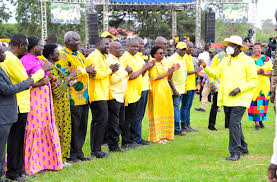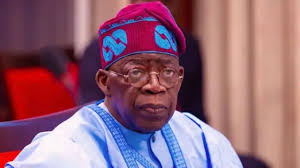President Yoweri Museveni, the National Resistance Movement (NRM) presidential candidate, has completed his campaign tour of the Lango sub-region, where he urged residents to focus on peace, unity, and wealth creation as Uganda heads toward the 2026 general elections.
During his visit, President Museveni held rallies in Amolatar, Dokolo, Alebtong, Otuke, Apac, Kwania, and Oyam districts. He called on citizens to embrace NRM’s vision of social stability and economic growth through self-reliance and government support programs.
Addressing large crowds, Museveni reminded Ugandans that NRM’s success over the years has come from rejecting tribalism and religious divisions.
“Since the 1960s, we realized that tribal and religious sectarianism were holding the country back. By removing these divisions, we built a strong national army that protects all Ugandans equally,” he said.
He added that Uganda is enjoying its longest period of peace in history, saying,
“For the first time in 500 years, Uganda is totally at peace. Every district contributes to the police and army — we no longer recruit by tribe, but by merit.”
Museveni said peace and security have allowed the government to invest in other key areas such as infrastructure, education, electricity, and healthcare, which continue to improve lives across the country.
The President highlighted several government projects in Lango, including upgrades to major roads such as Lira–Kamdini, Ochero–Amolatar–Namasale, and Dokolo road networks. He also promised to improve access to electricity and water to support economic activities in rural areas.
Museveni noted that the government has upgraded health centers across districts in Lango to bring healthcare closer to the people.
“When health centers are near you, families can access treatment easily, and this helps communities to stay healthy and productive,” he said.
While acknowledging progress in infrastructure, Museveni said Uganda’s biggest challenge remains wealth creation at the household level.
He explained that although programs like NAADS, Entandikwa, Operation Wealth Creation, and Bonna Bagaggawale were introduced, many Ugandans still depend on subsistence farming — producing only what they eat.
“Working for the stomach cannot grow our economy,” Museveni said. “Everyone must join the money economy. That’s why we introduced the Parish Development Model (PDM).”
Under the PDM, each parish receives UGX 500 million to support households with UGX 1 million each to start small businesses or farming projects. Museveni encouraged people to use the funds wisely, citing examples of families who have successfully improved their income through the program.
He also promoted the four-acre farming model, urging farmers to grow a mix of crops and raise livestock to maximize profits. For families near water bodies, he encouraged fish farming, calling it a profitable and sustainable source of income.
“Fish farming can change lives. You can feed your family and sell the surplus. We have examples of people who started small but are now earning millions,” he said.
While many residents welcomed Museveni’s promises and praised the government’s investments in infrastructure, others expressed concerns about limited accountability and unequal access to government programs.
Some local leaders asked for more direct involvement of communities in planning and monitoring development projects.
Museveni’s campaign in Lango showcased the NRM’s continued focus on stability, economic empowerment, and rural transformation. As Uganda prepares for the 2026 elections, the question remains whether the President’s message of peace and prosperity will resonate strongly enough with voters to secure another victory for the ruling party.



